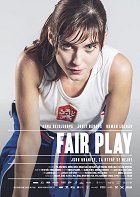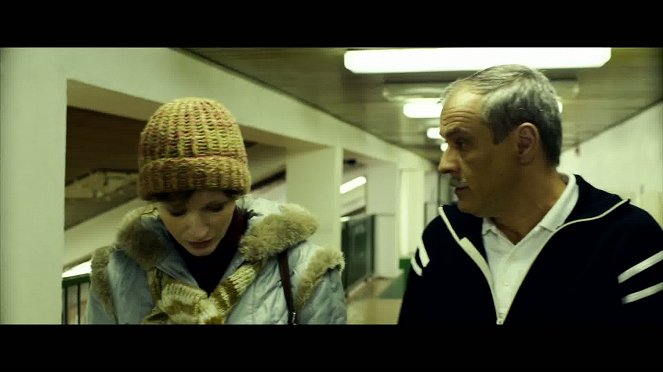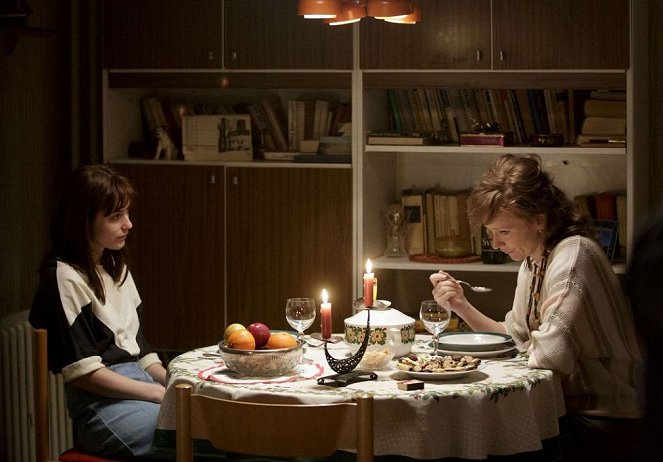Directed by:
Andrea SedláčkováScreenplay:
Andrea SedláčkováCinematography:
Jan Baset StřítežskýCast:
Judit Pecháček, Aňa Geislerová, Roman Luknár, Eva Podzimková, Ondřej Novák, Roman Zach, Igor Bareš, Jiří Wohanka, Ondřej Malý, Taťjana Medvecká (more)Plots(1)
1980's in Czechoslovakia. Young sprinter Anna (Judit Bárdos) becomes a member of The National Sports Centre. Her mother (Anna Geislerova) and her coach (Roman Luknar) hope she will meet requirements of qualification for the Olympics. The only thing which swerves Anna from her world of tough sports drill is her relationship with Tomas (Ondrej Novak). Anna starts unknowingly getting doped with anabolic steroids. Her performance is getting better but at the same time first health problems occur. Anna learns the truth about the drugs and although her participation at the Olympics is at stake she is going to continue in her training without them. However, her mother hopes Anna might use her participation at the Olympics as a mean of immigration and she decides to apply the steroids to Anna secretly, pretending it is nothing but doses of harmless vitamins. (official distributor synopsis)
(more)Videos (2)
Reviews (12)
Every year, two to three films are made in the Czech Republic that are really good (especially compared to the rest of domestic production). Fair Play is one of them. Powerful stories about being powerlessness in the days of socialism, about intimidation, blackmail and manipulation through an uncompromising regime have been told many times, but never in connection with sports. The directing is very precise and clean, and there is no lack of attention to detail and elaborate dialogues. Judit Bárdos in the main role of a talented athlete, Aňa Geislerová as her mother and Roman Luknár in the role of a strict coach also deserve praise. Satisfaction.
()
Run, Andula, run! So, actually... Take steroids, Andula, take steroids! The topic of "anabolic government programs for top athletes of the Eastern bloc through personal drama, we say hello to Kratochvílová and Fibinger" looks promising on paper and is likely to take moral and ethical (not only) historical skeletons out of the closet. Skeletons everyone prefers to remain silent about even today. But as a result, Fair Play doesn't play fair play with the viewer, because it opens the door of this closet so little that even a malnourished infant would have a significant problem putting his little finger inside. Sadly, the movie only stays on the surface and does not go into details. There is no room for having own opinion beyond the standardized Czechoslovak's conciliatory view of the normalization period in a style “this is how things worked during this period, it is not our fault, what can we do about it today". The same approach is true for most of Czech movies. Which is an even bigger letdown because this movie has a large potential to get out of this cursed box of current non-documentaries in the Czech republic. In fact, even the main story line "can she run so fast?" does not work, because of the Summer Olympic Games 1984, i.e. it is soon clear what this means for the finals. Simply another movie with good performances (although Bárdosová is clumsy, especially in tense scenes with Geislerová, but in those scenes when she is silent and only sweats, she looks determined and convincing) and routine craftsmanship that is not bad, not boring, but despite the theme has nothing to say. And so, the movie says nothing and just keeps up with the others, meaning, it politely remains silent, while another layer of dust is collected on the skeleton in the closet...
()
Fair Play doesn't comment too well on me because on one hand it pleased me, on the other it disappointed me. It's nice that it admits what everyone already knows, namely why Helena Fibingerova had such hairy legs, but it annoys me that the biggest heroes are once again those who escaped the evil Bolsheviks to the West, while the rest of us loyal servants proudly held the torch of socialism, of course excluding those whose escape failed, they suffered here of course. I'm tired of it already, I hope another regime change won't come, I wouldn't want to memorize the names of new heroes. It seems to me like the movie wants to be deeper than it really is, but I would still like to highlight the very decent performances, I would see the mistakes more in the screenplay.
()
SPOILERS: It's too bad that Andrea Sedláčková paradoxically makes things easier for her characters. Not so much on the level of physicality, which is one of the film's strengths, because the ability of Fair Play to slip into physical intimacy and be an unpleasant experience goes beyond domestic customs. The film is "easy"on a moral level, in which it depicts the failure of characters who either do not know that they are failing (Anna), or failing because they are forced to do so because of good intentions and resistance to the system (the mother). From a certain point of view, Fair Play can come off as a chain of creating an alibi for what could provocatively be a "sick parental ambition" in another context. The film is not so much about doping in socialist sports as it is about (from my perspective) a less probable scenario where anabolic steroids serve as a desperate attempt to escape the dull machinery of normalization. It's nice that Martin's colleague tells Anna "don't take it if it’s not allowed", but Anna doesn't have to deal with this dilemma at all in the end. In fact, there is no one to doubt, because even the mother does it purely in bona fide and eventually symbolically "pays" for it. Fair Play is such a pleasantly digestible soft drama, which is undoubtedly engaging and well-told, cleverly shot, but also extremely descriptive and semantically unambiguous (does the mother still have to throw up by the garbage cans after a suggestive interrogation on Bartolomějská street? Does the director believe so little in the effect of that scene? This is another one of those films where the little guy morally triumphs over the machinery of power, while the failures are secondary and actually only serve to highlight the fair play attitude of the protagonist. I think that this greatly undermines the impact and reach of the testimony. [60%] P. S. I admit that I made my own film in my mind, where the famous fate of the socialist bloc at the LA Olympics would be a cruel joke for the protagonist. It is probably because I am attracted by the fatalistic vision of the recent past, in which the little lies and compromises eventually catch up with the characters.
()
The first of those three films our country produces every year that we can be proud of. The story is simple and its scope and visuals are not as large-format as Burning Bush, but it has similar internal power and even more sensitively captured details. You will be touched and sad, but you will also be glad you’ve seen this.
()



Ads